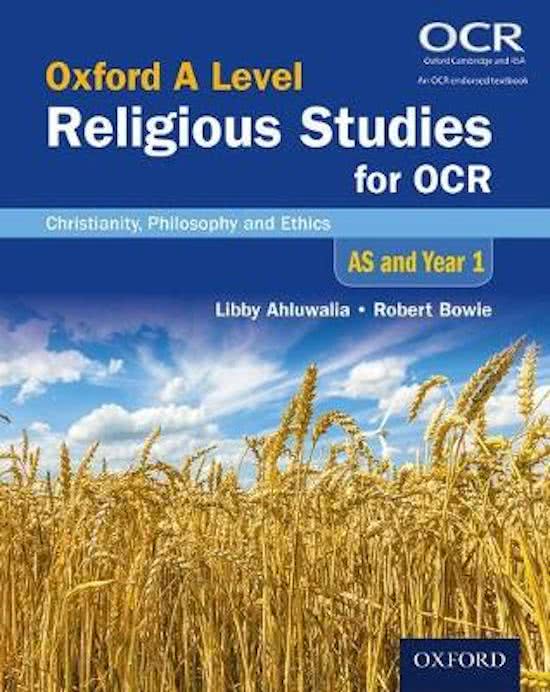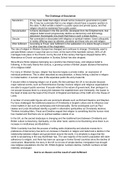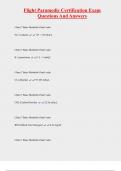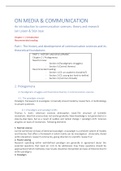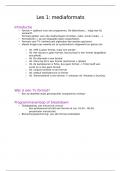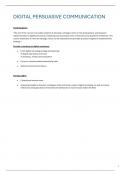The Challenge of Secularism
Secularism It may mean belief that religion should not be involved in government or public
life. It may be a principle that no one religion should have a superior position in
the state. It often entails a belief in a public space and private space, and that
religion should be restrained from public power
Secularisation A theory developed in the 50s and 60s, developed from the Enlightenment, that
religious belief would progressively decline as democracy and technology
advanced. Sociologists now doubt that there is such a linear decline.
Secular Not connected or associated with religious or spiritual matters. Used colloquially
in widely differing ways by atheists, pluralists and those who are anti-religion.
Wish fulfilment According to Freud, wish fulfilment is the satisfaction of a desire though a dream
or other exercise of the imagination.
The role of religion in Western Europe has changed and continues to change. Christianity used to
pervade British culture in ways that are no more. At the start of the twentieth century, 80% of UK
marriages took place in the Church, but by the end of the century that figure dropped below 40%.
Attendance at Church and participation in Sunday School has also dropped.
Steve Bruce thinks religious belonging as a practice has drained away, and religious belief is
following. In the early twenty-first century, a growing number of British people declared themselves
of no religious belief.
For many in Western Europe, religion has become largely a private matter, an expression of
individual preference. This is often described as secularisation, a theory linking a decline in religion
to modernisation. A secular view of life separates public life and private life.
If secular refers to keeping religion out of public life then perhaps the UK is not secular because
major national events, such as Remembrance Sunday involves religion and religious organisations
are able to support public services. If secular refers to the nature of government, then perhaps it is
not secular because there is a strong link between the establishment and Christianity; the Queen is
the head of state and the head of the Church of England and bishops of the CofE sit in the House of
Lords.
A number of vocal public figures who are prominent atheists such as Richard Dawkins and Stephen
Fry have challenged the traditional presence of Christianity in English culture and its influence over
moral matters in law such as euthanasia and homosexuality. Some sociologists such as Paul
Heelas and Linda Woodhead identify a growth in alternative spiritualities as Christianity declines.
Thinkers including Marx, Freud and Dawkins argued that religion is something that the human mind
has created and that there are no spiritual realities outside of us.
In the UK, as the sacred landscape is changing and the traditional bond between Christianity and
British culture is dissolving. Spirituality, on the other hand, seems to be flourishing since there is an
increase in mindfulness and Buddhism.
While it certainly true that the process of setting aside dictatorship and absolute monarchy in
preference of democracy has led to an increase in freedom in religion and belief and a decline in the
relationship between religion and government around the world, it is simplistic to argue that the
world is secularising in the way that Britain has. The vast majority of the world’s population still claim
adherence to religion, and there has been an upsurge in former Soviet countries since the decline of
communism. Meanwhile, the story in the UK is not one of simple decline; immigration has brought
new religious populations into the UK. Whilst Anglican numbers decline, Catholic numbers remain
relatively unchanged.
God is an illusion and the result of wish fulfilment
, Auguste Comte held the view that civilised society develops from the theological (religious view of
the world) to the metaphysical (abstract view of the world) to the positive (scientific/rational view of
the world). He believed that religion would give way to secular positivism and that the power of
scientific reasoning would rid society of all its false views of the world.
Sigmund Freud
Although he was clearly fascinated with religion and its appeal, Freud believed that religion and
modern religious beliefs are a delusion that exists to protect us from nature and fate. According to
Freud, religion is a product of wish fulfilment. The experience of vulnerability and helplessness that
humans experience as children is made more tolerable by the invented belief that there is a purpose
in life, with a moral code advanced by a higher wisdom, and that any injustices in this life will be
corrected in the next.
He believed that neuroses were the result of natural human instinctual fulfilments being
systematically repressed by tradition and conformity. In this way, Freud considered that religion,
notably Judaism and Christianity, was a primary cause of psychological illness. Human beings
personify the things they want to influence, so a deity or a divine force is invented to replace the
sense of uncertainty with something controllable. Freud therefore concluded that religion could do
some good, but for society to grow up and develop rationally, it should be abolished.
Religion also represses human desires, particularly desires that are destructive so society such as
sexual violence, theft and murder. The Commandments illustrate this with their emphasis on not
killing, not stealing and not committing adultery etc. Just as little children find comfort in living a
disciplined and ordered life imposed by their parents through rituals such as washing hands and
control of bladder and bowels, religious rituals continue the process through ‘suppression, the
renunciation of certain instinctual impulses’. This is especially noticeable in the repetition of religious
ceremonies in worship and prayers, which acknowledge the worshipper’s guilt and ask for
forgiveness. Repetition of this kind is obsessional because it keeps the ego from being controlled by
sexual and irrational urges. The repression of basic urges are replaced by the promises of after-life
and rewards.
Freud argues that religious ideas are highly prized because they provide information that humans
crave about things that cannot be discovered through the study of reality. This affects how religious
people look at those who do not share their ideas; “anyone who knows nothing of religious ideas is
very ignorant; and anyone who has added them to his knowledge may consider himself much the
richer”.
According to Freud, religion exploits infantile fears we have of things that we cannot change, and
represses negative human behaviours. Freud believed that religion is unhealthy; it is a cultural
carrier for much negative information, dividing people and causing conflict as non-believers, people
who do not have the religious knowledge that believers have, are seen as inferior. He can see that
religion is produced by uncertainty and anxiety about things beyond our control, but it creates
something unreliable and unhealthy.
An American doctor had written to Freud describing how, as a young medical student, he had seen
a dead “sweet-faced dear old woman” in a dissecting room which had caused him to lose his
Christian faith only to rediscover it shortly afterwards through a powerful conversion experience.
The purpose of the doctor’s letter was to persuade Freud to rethink his atheism and embrace
Christianity. God had not revealed himself to Freud or had answered any of his prayers, therefore
Freud claimed that he had no good reason to believe in him. Freud’s analysis of the man’s
experience offered a rational explanation for the doctor’s renewed faith in God and Christ as a
classic example of an Oedipus Complex.
Secularism It may mean belief that religion should not be involved in government or public
life. It may be a principle that no one religion should have a superior position in
the state. It often entails a belief in a public space and private space, and that
religion should be restrained from public power
Secularisation A theory developed in the 50s and 60s, developed from the Enlightenment, that
religious belief would progressively decline as democracy and technology
advanced. Sociologists now doubt that there is such a linear decline.
Secular Not connected or associated with religious or spiritual matters. Used colloquially
in widely differing ways by atheists, pluralists and those who are anti-religion.
Wish fulfilment According to Freud, wish fulfilment is the satisfaction of a desire though a dream
or other exercise of the imagination.
The role of religion in Western Europe has changed and continues to change. Christianity used to
pervade British culture in ways that are no more. At the start of the twentieth century, 80% of UK
marriages took place in the Church, but by the end of the century that figure dropped below 40%.
Attendance at Church and participation in Sunday School has also dropped.
Steve Bruce thinks religious belonging as a practice has drained away, and religious belief is
following. In the early twenty-first century, a growing number of British people declared themselves
of no religious belief.
For many in Western Europe, religion has become largely a private matter, an expression of
individual preference. This is often described as secularisation, a theory linking a decline in religion
to modernisation. A secular view of life separates public life and private life.
If secular refers to keeping religion out of public life then perhaps the UK is not secular because
major national events, such as Remembrance Sunday involves religion and religious organisations
are able to support public services. If secular refers to the nature of government, then perhaps it is
not secular because there is a strong link between the establishment and Christianity; the Queen is
the head of state and the head of the Church of England and bishops of the CofE sit in the House of
Lords.
A number of vocal public figures who are prominent atheists such as Richard Dawkins and Stephen
Fry have challenged the traditional presence of Christianity in English culture and its influence over
moral matters in law such as euthanasia and homosexuality. Some sociologists such as Paul
Heelas and Linda Woodhead identify a growth in alternative spiritualities as Christianity declines.
Thinkers including Marx, Freud and Dawkins argued that religion is something that the human mind
has created and that there are no spiritual realities outside of us.
In the UK, as the sacred landscape is changing and the traditional bond between Christianity and
British culture is dissolving. Spirituality, on the other hand, seems to be flourishing since there is an
increase in mindfulness and Buddhism.
While it certainly true that the process of setting aside dictatorship and absolute monarchy in
preference of democracy has led to an increase in freedom in religion and belief and a decline in the
relationship between religion and government around the world, it is simplistic to argue that the
world is secularising in the way that Britain has. The vast majority of the world’s population still claim
adherence to religion, and there has been an upsurge in former Soviet countries since the decline of
communism. Meanwhile, the story in the UK is not one of simple decline; immigration has brought
new religious populations into the UK. Whilst Anglican numbers decline, Catholic numbers remain
relatively unchanged.
God is an illusion and the result of wish fulfilment
, Auguste Comte held the view that civilised society develops from the theological (religious view of
the world) to the metaphysical (abstract view of the world) to the positive (scientific/rational view of
the world). He believed that religion would give way to secular positivism and that the power of
scientific reasoning would rid society of all its false views of the world.
Sigmund Freud
Although he was clearly fascinated with religion and its appeal, Freud believed that religion and
modern religious beliefs are a delusion that exists to protect us from nature and fate. According to
Freud, religion is a product of wish fulfilment. The experience of vulnerability and helplessness that
humans experience as children is made more tolerable by the invented belief that there is a purpose
in life, with a moral code advanced by a higher wisdom, and that any injustices in this life will be
corrected in the next.
He believed that neuroses were the result of natural human instinctual fulfilments being
systematically repressed by tradition and conformity. In this way, Freud considered that religion,
notably Judaism and Christianity, was a primary cause of psychological illness. Human beings
personify the things they want to influence, so a deity or a divine force is invented to replace the
sense of uncertainty with something controllable. Freud therefore concluded that religion could do
some good, but for society to grow up and develop rationally, it should be abolished.
Religion also represses human desires, particularly desires that are destructive so society such as
sexual violence, theft and murder. The Commandments illustrate this with their emphasis on not
killing, not stealing and not committing adultery etc. Just as little children find comfort in living a
disciplined and ordered life imposed by their parents through rituals such as washing hands and
control of bladder and bowels, religious rituals continue the process through ‘suppression, the
renunciation of certain instinctual impulses’. This is especially noticeable in the repetition of religious
ceremonies in worship and prayers, which acknowledge the worshipper’s guilt and ask for
forgiveness. Repetition of this kind is obsessional because it keeps the ego from being controlled by
sexual and irrational urges. The repression of basic urges are replaced by the promises of after-life
and rewards.
Freud argues that religious ideas are highly prized because they provide information that humans
crave about things that cannot be discovered through the study of reality. This affects how religious
people look at those who do not share their ideas; “anyone who knows nothing of religious ideas is
very ignorant; and anyone who has added them to his knowledge may consider himself much the
richer”.
According to Freud, religion exploits infantile fears we have of things that we cannot change, and
represses negative human behaviours. Freud believed that religion is unhealthy; it is a cultural
carrier for much negative information, dividing people and causing conflict as non-believers, people
who do not have the religious knowledge that believers have, are seen as inferior. He can see that
religion is produced by uncertainty and anxiety about things beyond our control, but it creates
something unreliable and unhealthy.
An American doctor had written to Freud describing how, as a young medical student, he had seen
a dead “sweet-faced dear old woman” in a dissecting room which had caused him to lose his
Christian faith only to rediscover it shortly afterwards through a powerful conversion experience.
The purpose of the doctor’s letter was to persuade Freud to rethink his atheism and embrace
Christianity. God had not revealed himself to Freud or had answered any of his prayers, therefore
Freud claimed that he had no good reason to believe in him. Freud’s analysis of the man’s
experience offered a rational explanation for the doctor’s renewed faith in God and Christ as a
classic example of an Oedipus Complex.

